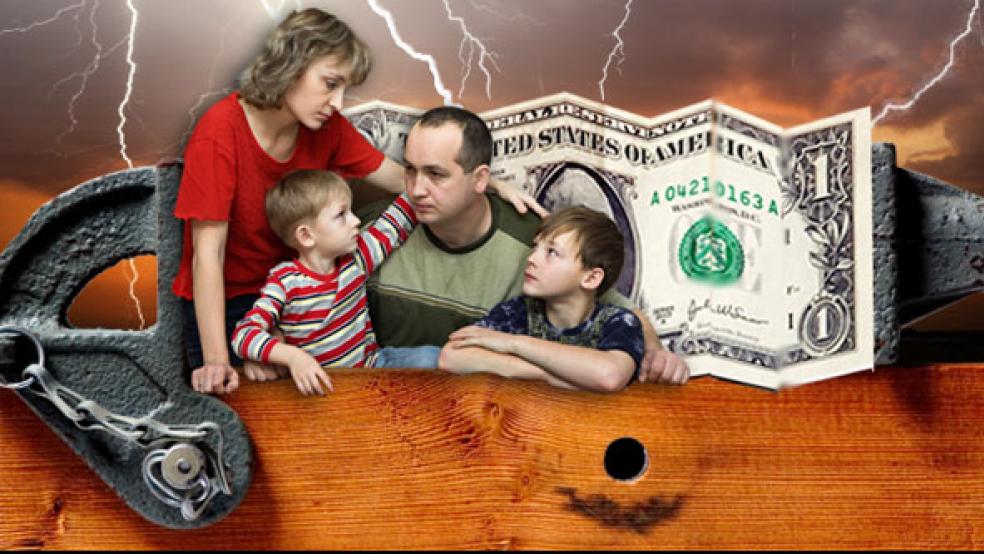As Paul Krugman observed recently, “the urge to see depression as a necessary and somehow even desirable punishment for past sins, while inveighing against any attempt to mitigate suffering — is as strong as ever.” Many of those who see our economic problems in these terms believe the sin we committed is too much debt fueled consumption and government spending. According to this view punishments such as austerity and high levels of unemployment provide a moral lesson that helps to prevent us from making the same mistakes again.

This is bad economics and it has the moral lesson all wrong. It wasn’t government debt that caused our problems, or households consuming beyond their means. It was an out of control, unregulated, over-leveraged financial sector. Cutting government spending and urging households to save more may or may not have merit, but it does nothing to solve the problems that caused the financial meltdown and subsequent recession. That will require strict financial sector regulation.
As for the moral lesson, if we are going to punish people, shouldn’t it be the people who actually caused the problems rather than innocent bystanders? Why should the working class pay for problems caused by people making huge profits in the financial sector as they inflated a dangerous housing price bubble? Why should the working class be burdened with high and prolonged levels of unemployment, their children’s futures diminished with cuts to teachers, Head Start, Medicaid, and so on when it was the financial sector that caused the problems? What moral lesson are workers supposed to learn from all of this, that bad things happen to good people?
The real moral lesson here is that we need to protect the innocent, and as much as possible the protection should be paid for by those who cause them problems. But how do we do that? First, by improving social insurance protection for the working class. In an increasingly global economy, workers are far less secure than they were just a few decades ago. Add to that the problems that come with recessions, and it’s clear that workers do not have the social insurance they need.
Second, we need to do a better job of using monetary and fiscal policy to offset economic downturns. Fiscal policy was used early in the recession, but the fiscal stimulus package was not big enough to really make a difference and it contained too many tax cuts. Even worse, overall government spending has actually fallen during the recession rather than increasing temporarily as we needed, and there has been too little effort to implement a serious job creation program. Monetary policy has been much better than fiscal policy, but the Fed was behind the curve, saw green shoots around every corner when it faced hard decisions about doing more to help the economy, and it was not aggressive enough in the early stages of the recession.
Third, even with the best possible social insurance programs we won’t be able to offset all the costs of a financial recession. The innocent will still be hurt to some degree. To minimize the harm, we need to use aggressive financial regulation – particularly limits on leverage – reduce the chance of severe problems erupting in the financial sector.
If the wealthiest members of society are allowed to reap the benefits when things go well, and then push the costs off on the working class when the financial sector crashes, they will take more risk than they should. That’s the moral hazard we worry so much about in other contexts.
Moral hazard would be less of a problem if the money needed to protect the working class in a financial recession came out of the pockets of the big wigs on Wall Street who created the problems. If they faced losing everything, they would be much more careful about the risks they take at the expense of the working class.
However, the severe penalties needed to correct the moral hazard problem, for example double indemnity for stakeholders in financial firms if the firm goes bankrupt, are very unlikely to be imposed because it requires those with the most economic and political power to take responsibility for their own actions and then pay a very high cost. It’s much easier on the psyche and pocketbook to tell a story where someone else is to blame for financial meltdowns.
Better protection for the working class in the form of social insurance, countercyclical policy, and financial regulation can be justified without the need for a moral “sinner-punishment” framework. But for those who want to put it in these terms – as many do – we can at least take a step in the direction of getting the moral equation right by reining in the financial sector, increasing the taxes of those at the top, and using the proceeds to better protect the working class.






